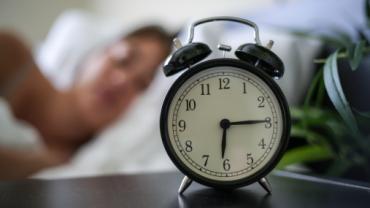
Modern industrialized society sometimes feels like a constant competition in which the winner is always doing more: Who can lift the most weight? Who makes the most money? Who drives the most expensive car? There’s only one area where people like to brag about how little they do and that’s sleep. It’s almost a badge of honor for people to brag about how late they stay up or how little sleep they need to function. (Never mind the coffee they inhale immediately upon waking or the energy drink they mainline when they start crashing at 3 pm.) But racking up sleep debt isn’t a contest and the consequences are no laughing matter. In fact chronic sleep insufficiency can trigger serious metabolic effects some of which make caffeine dependence seem downright benign.
Chronic sleep debt is associated with developing obesity metabolic syndrome and other health complications. This could be especially important for patients who seem to be doing all the right things but are still struggling to lose stubborn excess body fat. They’re eating a healthy diet getting sufficient exercise their thyroid and adrenals are functioning well but the weight just won’t budge. When all other factors seem to be in line but excess fat is still an issue insufficient sleep could be the missing piece of the puzzle.
With the flood of research regarding the influence of the intestinal microbiome on everything from obesity to neurological and cardiovascular conditions it’s possible that some of the underlying pathology starts with disrupting the circadian rhythm of our gut bugs. If human beings have circadian rhythms it makes sense that the symbiotic microorganisms inhabiting our bodies do too. Disruptions in sleep patterns may also lead to elevated evening cortisol levels feeding into a vicious cycle of yet more sleep debt and endocrine dysregulation.
But regarding the effects of too little sleep on overweight and obesity specifically there are even more obvious potential causative connections. Insufficient sleep downregulates leptin levels and upregulates ghrelin in a double-whammy for reducing satiety and increasing appetite. Shortened and/or fragmented sleep also reduce insulin sensitivity and impair glucose tolerance. Combine this with a natural tendency for people to seek high-carbohydrate foods to provide a quick energy boost and the implications for weight gain are obvious. Weight gain is the result of complex biochemical processes that can’t be boiled down to something as straightforward as eating too much and moving too little. However the conventional advice to “eat less and move more” isn’t completely off-base and insufficient sleep might influence behavior in both of these areas. Too little sleep makes people hungry and tired—that is more likely to eat more and move less. (If a patient is tired and hungry odds are against them being in the mood to hit the gym.)
Obesity is only one consequence of insufficient sleep. Far more nefarious issues can result. For example due to the role of sleep in regulating insulin signaling and glucose handling sleep dysregulation is closely associated with type 2 diabetes. Many type 2 diabetics may have undiagnosed obstructive sleep apnea which will impede their blood glucose control even in the presence of hypoglycemic medications and dietary modifications.
Some of the influence of sleep on metabolism is the result of signaling at the cellular level. The melatonin-producing pineal gland isn’t the only structure in the body that has a circadian clock. Other parts of the body including the liver intestines and adipose tissue also have “clocks” that regulate their secretory activity and other functions. This might be why Traditional Chinese Medicine (TCM) has long recognized that specific organs are associated with certain times of day and night. It may well be that different organs and glands exhibit greater and lesser activity at certain times of day. This is especially interesting considering the role of the liver in regulating blood glucose lipids and lipoproteins.
Making time for a hard workout is important for maintaining insulin sensitivity building lean muscle mass and helping to reach a healthy body weight. But it’s not all about getting into the gym. Considering the impact circadian rhythms have on multiple aspects of human physiology getting into bed at a reasonable hour and getting a good night’s sleep could be just as important.